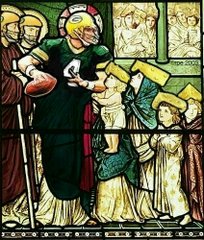 Prayer
Prayer Almighty and everlasting God, grant us by Your grace so to pass through this holy time of our Lord's passion that we may obtain the forgiveness of our sins; through Jesus Christ, Your Son, our Lord, who lives and reigns with You and the Holy Spirit, one God, now and forever.
Devotional Reading
"'[Jesus our Lord] was delivered up for our trespasses and raised for our justification' (Rm 4:25). See how after mentioning the cause of His death, he makes the same cause likewise a demonstration of the resurrection. For why, he means, was Jesus crucified? Not for any sin of His own. This is clear from the resurrection. For if He were a sinner, how would He have risen? But if He rose, it is quite plain that He was not a sinner. If He was not a sinner, why was He crucified? He was crucified for others, and if for others, then surely He rose again. Now to prevent your asking, 'How, when He became liable for such great sins, did we come to be justified?' Paul points out the One who blots out all sins, using both Abraham's faith by which he was justified, and the Savior's suffering and death, by which we were freed from our sins to confirm what he said. And after mentioning His death, he speaks also of His resurrection. For the purpose of His dying was not that He might hold us liable to punishment and under condemnation, but that He might do good to us. For this cause He both died and rose again, that He might accomplish righteousness."
John Chrysostom, Homilies on Romans
Catechesis
Luther's Large Catechism
V. The Sacrament of the Altar
What is the benefit of this eating and drinking?
...20 So we have, in a brief way, covered the first point that deals with this Sacrament’s essence. Now examine further the effectiveness and benefits that really caused the Sacrament to be instituted. This is its most necessary part, so that we may know what we should seek and gain there. 21 This is plain and clear from the words just mentioned, “This is My body and blood, given and shed for you for the forgiveness of sins.” 22 Briefly, that is like saying, “For this reason we go to the Sacrament: there we receive such a treasure by and in which we gain forgiveness of sins.” “Why so?” “Because the words stand here and give us this. Therefore, Christ asks me to eat and drink, so that this treasure may be my own and may benefit me as a sure pledge and token. In fact, it is the very same treasure that is appointed for me against my sins, death, and every disaster.”
23 On this account it is indeed called a food of souls, which nourishes and strengthens the new man. For by Baptism we are first born anew [John 3:5]. But, as we said before, there still remains the old vicious nature of flesh and blood in mankind. There are so many hindrances and temptations of the devil and of the world that we often become weary and faint, and sometimes we also stumble [Hebrews 12:3].
24 Therefore, the Sacrament is given as a daily pasture and sustenance, that faith may refresh and strengthen itself [Psalm 23:1–3] so that it will not fall back in such a battle, but become ever stronger and stronger. 25 The new life must be guided so that it continually increases and progresses. 26 But it must suffer much opposition. For the devil is such a furious enemy. When he sees that we oppose him and attack the old man, and that he cannot topple us over by force, he prowls and moves about on all sides [1 Peter 5:8]. He tries every trick and does not stop until he finally wears us out, so that we either renounce our faith or throw up our hands and put up our feet, becoming indifferent or impatient. 27 Now to this purpose the comfort of the Sacrament is given when the heart feels that the burden is becoming too heavy, so that it may gain here new power and refreshment.
Concordia : The Lutheran Confessions. Edited by Paul Timothy McCain. St. Louis, MO : Concordia Publishing House, 2005, S. 433






No comments:
Post a Comment